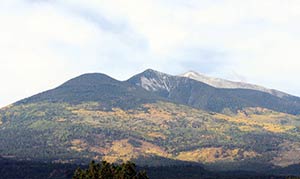Groundwater, not wastewater for Dook'o'ooslííd?
By Alastair Lee Bitsoi
Navajo Times
WINDOW ROCK, Oct. 13, 2011

On Oct. 5, Dookooslííd, also known as the San Francisco Peaks, displayed fall colors and some snow in this photo taken by Calvin Johnson of Leupp, Ariz.
The legislation, if passed by the Council, would move the Navajo Nation past the lost fight to prevent artificial snowmaking and focus on damage control.
The bill states that the U.S. Supreme Court's refusal to hear the tribe's appeal against artificial snowmaking on the San Francisco Peaks "leaves the Navajo Nation seeking alternative means of addressing the defilement of the sacred mountain including supporting the use of groundwater in the artificial snowmaking process."
Walter Phelps (Cameron/Coalmine Mesa/Leupp/Tolani Lake/Tsidii To'ii) said his purpose in sponsoring the legislation is to prompt discussion of the nation's options when faced with any sort of desecration of sacred sites, such as what the Forest Service has approved at the Snowbowl.
"The permit that exists right now only authorizes reclaimed water," Phelps said. "We have to look and discuss alternatives."
Phelps said the legislation, if passed, only reinforces and clarifies the tribe's position against the use of reclaimed sewage effluent on sacred soil.
"It does not mean I support freshwater, but that the nation needs to seek out and clarify its position," Phelps said. "If, at the end, Council does not want snowmaking, period, we'll honor that. That will be the nation's position."
The last time the tribe took an official stance on the Peaks was when Thomas Walker, who represented a portion of Phelps' district in the previous Navajo Nation Council, spearheaded a tribal united front to oppose snowmaking with reclaimed water last year.
The public comment period on the Peaks bill ended Tuesday, and it is now headed to the Resources and Development Committee and Nabik'yati Committee before going to the full Council for consideration.
Tribal law requires that legislation be posted on the Council's Web site for a five-day comment period. The bill, which was posted Oct. 7, had received one comment as of Monday, from Klee Benally of Forest Lake, Ariz.
Benally opposed the bill, saying it would weaken the tribe's position that manipulating the environment of a sacred site, as artificial snowmaking does, is unacceptable.
"The proposed legislation sends the message that desecration of Dook'o'ooslííd is approved by the Navajo Nation," Benally said, adding that the bill would also undermine two court cases still underway - Save the Peaks Coalition vs. U.S. Forest Service and the Hopi Tribe vs. City of Flagstaff.
"The writers of this legislation did not consult or engage in dialogue with litigants, NGOs and individuals who have long been actively engaged in the issue," Benally said. "At minimum the Navajo Nation Council should convene a meeting with these stakeholders prior to considering an action of this nature."
In addition to Benally's comment, the Hopi Tribe issued a press release on Tuesday opposing Phelps's resolution.
According to the press release, Hopi Tribal Chairman LeRoy N. Shingoitewa and the Hopi Tribal Council will not support the use of groundwater on Nuvatukyaovi, the Hopi name for the Peaks, raising the issue of water scarcity.
The only potential source of groundwater would be the city of Flagstaff, which already rejected the proposal on grounds that it needs all of its potable water for municipal uses.
"Water - regardless of its source - is a limited and critical natural resource in the Southwest and the Hopi Tribe continues to oppose any artificial snowmaking by these means," tribal leaders said in the press release.
"The Hopi Tribe has maintained unwavering opposition to any type of artificial snowmaking on the San Francisco Peaks, whether from reclaimed wastewater, recovered reclaimed water or groundwater," they stated. "The only water appropriate for Nuvatukyaovi is natural water as provided by rain and snow, and there can be no exceptions."
Shingoitewa agreed with the Hopi Council that the only solution to protect the sanctity of the Peaks is to prevent any and all artificial snowmaking and void the contract between the city of Flagstaff and Arizona Snowbowl to supply treated municipal wastewater.
"The Hopi Tribal Council, all known Hopi religious practitioners, the Hopi Tribe and its people are still, and always will be, opposed to the use of any snowmaking operations on Nuvatukyaovi," Shingoitewa said.
To the Hopi, Nuvatukyaovi is a holy place where Hopi deities - the Katsinam - bring moisture to the region and is a temple that plays an important role in Hopi culture, traditions and way of life.
Both Hopi and Navajo traditional practitioners fear that tampering with the spiritual forces at home on the Peaks could unleash consequences beyond the ability of humans to predict or control.
According to Phelps, the bill is tentatively scheduled to go before the Resources and Development Committee the week after the Council's fall session, which begins Oct. 17.
"I don't expect the Resources and Development Committee to address it until the end of the month," he added.

